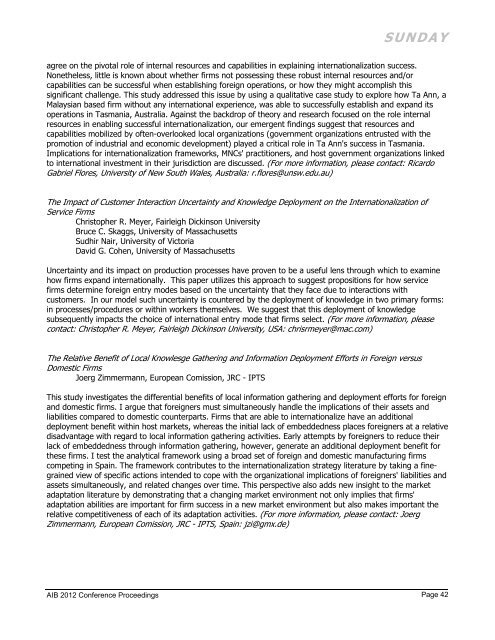AIB 2012 Conference Proceedings - Academy of International ...
AIB 2012 Conference Proceedings - Academy of International ...
AIB 2012 Conference Proceedings - Academy of International ...
You also want an ePaper? Increase the reach of your titles
YUMPU automatically turns print PDFs into web optimized ePapers that Google loves.
SUNDAY<br />
agree on the pivotal role <strong>of</strong> internal resources and capabilities in explaining internationalization success.<br />
Nonetheless, little is known about whether firms not possessing these robust internal resources and/or<br />
capabilities can be successful when establishing foreign operations, or how they might accomplish this<br />
significant challenge. This study addressed this issue by using a qualitative case study to explore how Ta Ann, a<br />
Malaysian based firm without any international experience, was able to successfully establish and expand its<br />
operations in Tasmania, Australia. Against the backdrop <strong>of</strong> theory and research focused on the role internal<br />
resources in enabling successful internationalization, our emergent findings suggest that resources and<br />
capabilities mobilized by <strong>of</strong>ten-overlooked local organizations (government organizations entrusted with the<br />
promotion <strong>of</strong> industrial and economic development) played a critical role in Ta Ann's success in Tasmania.<br />
Implications for internationalization frameworks, MNCs' practitioners, and host government organizations linked<br />
to international investment in their jurisdiction are discussed. (For more information, please contact: Ricardo<br />
Gabriel Flores, University <strong>of</strong> New South Wales, Australia: r.flores@unsw.edu.au)<br />
The Impact <strong>of</strong> Customer Interaction Uncertainty and Knowledge Deployment on the <strong>International</strong>ization <strong>of</strong><br />
Service Firms<br />
Christopher R. Meyer, Fairleigh Dickinson University<br />
Bruce C. Skaggs, University <strong>of</strong> Massachusetts<br />
Sudhir Nair, University <strong>of</strong> Victoria<br />
David G. Cohen, University <strong>of</strong> Massachusetts<br />
Uncertainty and its impact on production processes have proven to be a useful lens through which to examine<br />
how firms expand internationally. This paper utilizes this approach to suggest propositions for how service<br />
firms determine foreign entry modes based on the uncertainty that they face due to interactions with<br />
customers. In our model such uncertainty is countered by the deployment <strong>of</strong> knowledge in two primary forms:<br />
in processes/procedures or within workers themselves. We suggest that this deployment <strong>of</strong> knowledge<br />
subsequently impacts the choice <strong>of</strong> international entry mode that firms select. (For more information, please<br />
contact: Christopher R. Meyer, Fairleigh Dickinson University, USA: chrisrmeyer@mac.com)<br />
The Relative Benefit <strong>of</strong> Local Knowlesge Gathering and Information Deployment Efforts in Foreign versus<br />
Domestic Firms<br />
Joerg Zimmermann, European Comission, JRC - IPTS<br />
This study investigates the differential benefits <strong>of</strong> local information gathering and deployment efforts for foreign<br />
and domestic firms. I argue that foreigners must simultaneously handle the implications <strong>of</strong> their assets and<br />
liabilities compared to domestic counterparts. Firms that are able to internationalize have an additional<br />
deployment benefit within host markets, whereas the initial lack <strong>of</strong> embeddedness places foreigners at a relative<br />
disadvantage with regard to local information gathering activities. Early attempts by foreigners to reduce their<br />
lack <strong>of</strong> embeddedness through information gathering, however, generate an additional deployment benefit for<br />
these firms. I test the analytical framework using a broad set <strong>of</strong> foreign and domestic manufacturing firms<br />
competing in Spain. The framework contributes to the internationalization strategy literature by taking a finegrained<br />
view <strong>of</strong> specific actions intended to cope with the organizational implications <strong>of</strong> foreigners' liabilities and<br />
assets simultaneously, and related changes over time. This perspective also adds new insight to the market<br />
adaptation literature by demonstrating that a changing market environment not only implies that firms'<br />
adaptation abilities are important for firm success in a new market environment but also makes important the<br />
relative competitiveness <strong>of</strong> each <strong>of</strong> its adaptation activities. (For more information, please contact: Joerg<br />
Zimmermann, European Comission, JRC - IPTS, Spain: jzi@gmx.de)<br />
<strong>AIB</strong> <strong>2012</strong> <strong>Conference</strong> <strong>Proceedings</strong><br />
Page 42

















